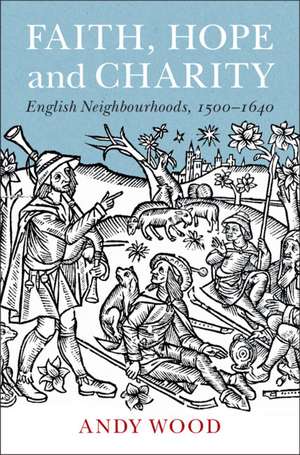Faith, Hope and Charity: English Neighbourhoods, 1500–1640
Autor Andy Wooden Limba Engleză Paperback – 21 oct 2020
| Toate formatele și edițiile | Preț | Express |
|---|---|---|
| Paperback (1) | 192.65 lei 3-5 săpt. | +15.69 lei 6-12 zile |
| Cambridge University Press – 21 oct 2020 | 192.65 lei 3-5 săpt. | +15.69 lei 6-12 zile |
| Hardback (1) | 555.50 lei 3-5 săpt. | |
| Cambridge University Press – 21 oct 2020 | 555.50 lei 3-5 săpt. |
Preț: 192.65 lei
Nou
Puncte Express: 289
Preț estimativ în valută:
36.86€ • 38.49$ • 30.51£
36.86€ • 38.49$ • 30.51£
Carte disponibilă
Livrare economică 14-28 martie
Livrare express 27 februarie-05 martie pentru 25.68 lei
Preluare comenzi: 021 569.72.76
Specificații
ISBN-13: 9781108814454
ISBN-10: 110881445X
Pagini: 306
Dimensiuni: 152 x 228 x 17 mm
Greutate: 0.41 kg
Editura: Cambridge University Press
Colecția Cambridge University Press
Locul publicării:Cambridge, United Kingdom
ISBN-10: 110881445X
Pagini: 306
Dimensiuni: 152 x 228 x 17 mm
Greutate: 0.41 kg
Editura: Cambridge University Press
Colecția Cambridge University Press
Locul publicării:Cambridge, United Kingdom
Cuprins
List of Abbreviations; Preface and Acknowledgements; 1. Charity Never Faileth: Defining Neighbourhood; 1.1 The Crisis of Neighbourhood; 1.2 Who Is My Neighbour?; 1.3 Charity and Neighbourhood; 1.4 Christian Neighbours; 2. Charity Suffereth Long: Neighbourhood and Community; 2.1 'A Nere Neyghbour is Better than a Farre Frende': The Social Logic of Neighbourhood; 2.2 Paternalism and the Reinforcement of Hierarchy; 2.3 Alcohol, Alehouses and Good Neighbourhood; 2.4 Festivity, Play and the Celebration of Neighbourhood; 3. Now Abideth Faith, Hope and Charity: Place Neighbourhood and People; 3.1 Public Worlds; 3.2 Nation, Country and Neighbourhood; 3.3 'A Packe of People'? Urban Neighbourhoods; 3.4 'A Kynde of Murdering my Neighbor': Disputes and their Settlement; 3.5 The Gender of Neighbourhood; 4. The Tongues of Men and Angels: Inclusion and Exclusion; 4.1 Newfangled Precisians: Neighbourhood and Religious Division; 4.2 Community Turned Inside Out: Witches, Gossips and Informers; 4.3 The Plight of Thomas Barebones: Settlement, Place and Neighbourhood; 4.4 The Better Sort and the Domination of Parish Politics; 4.5 Robin Starveling and the Destroying Angel: Famine, Disease and the Limits of Neighbourhood; Bibliography; Index.
Recenzii
'A profound and impassioned account of what it meant to be a neighbour in an age of societal transformation. By reappraising the relationship between the idea and experience of neighbourliness, often viewed in terms of conflict or decline, Wood demonstrates vividly how perennial bonds between working people were emotionally rewarding as well as economically functional.' Malcolm Gaskill, University of East Anglia
'An extraordinary archival exploration into what early modern people thought and said about belonging and exclusion. Andy Wood gives voice to those who experienced the values of faith, hope and charity most sharply, through the ongoing tensions between collectivity and exclusion, in the streets and villages of early modern England; this book shows how neighbourhood was both an abstract ideal and a mode of emotional and social engagement, gendered power and social interaction.' Laura Gowing, Kings College London
'A deeply empathetic exploration of how the ideal of neighbourhood continued to be used to hold early modern communities together in the face of new challenges like Puritanism, and old such as hunger and disease. It is, as Wood states, a celebration of 'voices in the archive' as they expressed the need for togetherness.' Craig Muldrew, University of Cambridge
'… engrossing … Wood's book … feels freshly relevant in showing how the values of neighbourhood were co-opted by the state … [it also testifies] movingly to the ability of ordinary people to sustain themselves, and their neighbours, even in the worst of times.' Arnold Hunt, Times Literary Supplement
'His archival terrain is bountiful. Drawing on a remarkable range of materials (from ballads, plays, court records, parish records, and a wide array of social commentary in print and manuscript) Wood provides a richly textured account of the ways in which principles of common humanity could produce and consolidate bonds across various divides shaped by belief, gender, and locality as well as social politics.' Alexandra Shepard, Family & Community History
'An extraordinary archival exploration into what early modern people thought and said about belonging and exclusion. Andy Wood gives voice to those who experienced the values of faith, hope and charity most sharply, through the ongoing tensions between collectivity and exclusion, in the streets and villages of early modern England; this book shows how neighbourhood was both an abstract ideal and a mode of emotional and social engagement, gendered power and social interaction.' Laura Gowing, Kings College London
'A deeply empathetic exploration of how the ideal of neighbourhood continued to be used to hold early modern communities together in the face of new challenges like Puritanism, and old such as hunger and disease. It is, as Wood states, a celebration of 'voices in the archive' as they expressed the need for togetherness.' Craig Muldrew, University of Cambridge
'… engrossing … Wood's book … feels freshly relevant in showing how the values of neighbourhood were co-opted by the state … [it also testifies] movingly to the ability of ordinary people to sustain themselves, and their neighbours, even in the worst of times.' Arnold Hunt, Times Literary Supplement
'His archival terrain is bountiful. Drawing on a remarkable range of materials (from ballads, plays, court records, parish records, and a wide array of social commentary in print and manuscript) Wood provides a richly textured account of the ways in which principles of common humanity could produce and consolidate bonds across various divides shaped by belief, gender, and locality as well as social politics.' Alexandra Shepard, Family & Community History
Notă biografică
Descriere
Explores the hidden lives of neighbourhoods in early modern England - their communal ideals, social practices, notions of gender, locality and belonging.
